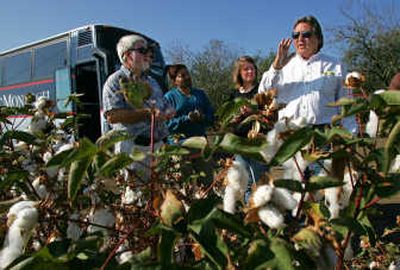Farmers ditching cotton crops

FIREBAUGH, Calif. – Growing cotton has rarely been a more risky proposition than it is now, which is precisely why cotton farmer Frank Williams is planning to sow his fields with wheat.
From Williams’ California fields to the Texas plains, farmers are plowing under cotton – once the king of U.S. agriculture – to seed crops that make more money.
Cotton also has lost ground for another reason that has become apparent as the Senate has debated the 2007 farm bill: The United States’ cotton subsidy program is enmeshed in a global trade battle.
Last month, the World Trade Organization ruled subsidies handed out to American cotton farmers broke international trade laws, opening the door for foreign countries to levy billions of dollars in penalties against the U.S.
The current bill on the Senate floor leaves those programs virtually intact, despite the threat of further legal complaints and concerns that international sanctions ultimately could cause layoffs and patchy unemployment. The Bush administration has threatened to veto the multibillion-dollar farm package wholesale, saying the Senate bill would impair negotiations with the WTO.
For Williams, that risk, coupled with predicted water shortages, is too much to bear.
“We can probably do just as well growing grain with just the same amount of water or less,” said Williams, 56, who plans uproot the downy Upland cotton he grows in Firebaugh, about 160 miles southeast of San Francisco, and leave in only a lucrative, organic variety of the crop.
This year, cotton acreage nationwide dropped 28 percent, hitting an 18-year low at 11.1 million acres, according to the U.S. Department of Agriculture.
As textile mills moved offshore over the past decade to set up shop where labor costs are cheaper, the market for U.S. cotton also shifted abroad. Producers now ship 70 percent of their bales to foreign markets, often to mills and spinners in India, Pakistan and China.
That means domestic subsidy programs are increasingly prone to international scrutiny. In 2003, bitter arguments over U.S. farm support programs, including cotton subsidies, contributed to the collapse of world trade talks in Cancun, Mexico.
In 2003, the Brazilian government took its case against American cotton to global trade court, claiming U.S. farm subsidies were driving down the worldwide price of cotton and harming Brazilian farmers. Two years later, the WTO sided with Brazil, an emerging cotton heavyweight, and forced the U.S. to eliminate a particular cotton payment.
Last month, a WTO compliance panel went a step further, saying the U.S. had failed to scrap another series of illegal subsidies paid to American cotton growers.
Those very programs have been left almost intact in the bill currently under debate, prompting outcry from reformists who want farm policy to support a more diverse produce basket.
“We’re telling farmers to go ahead and grow conventional cotton for a market that has come under a WTO cloud,” said Ken Cook, president of the Environmental Working Group, a nonprofit organization that advocates for farm policy reform. “All that does is get us into trouble with our trading partners.”